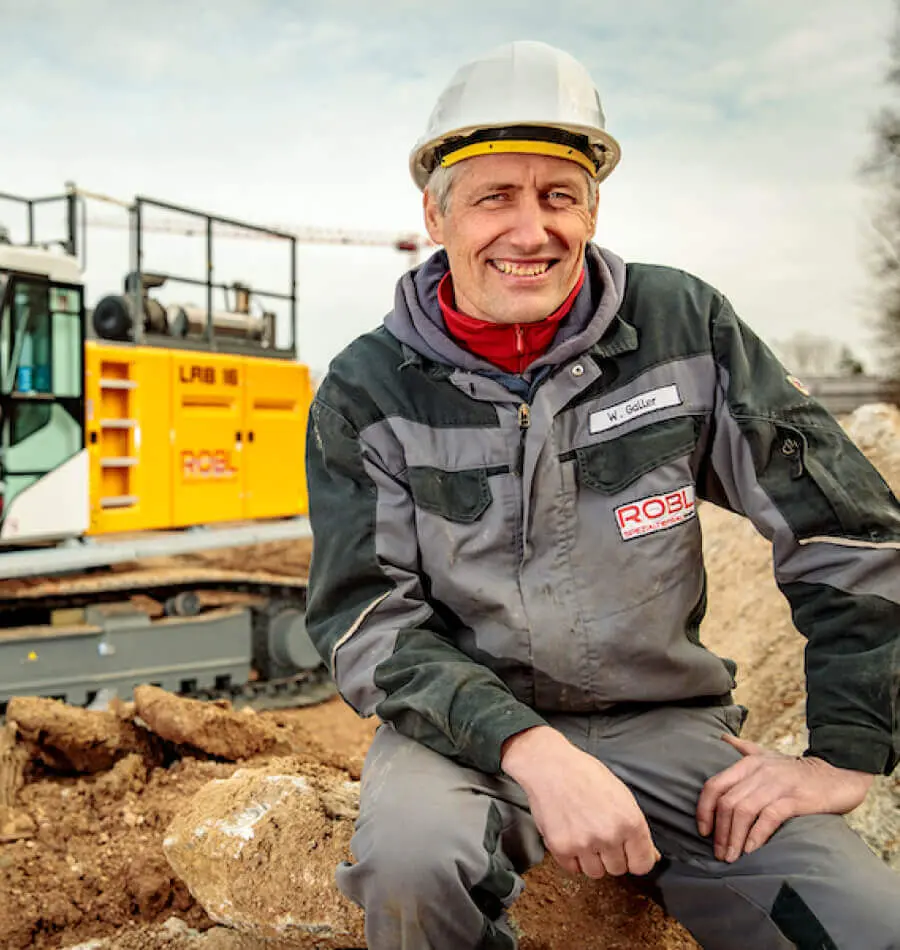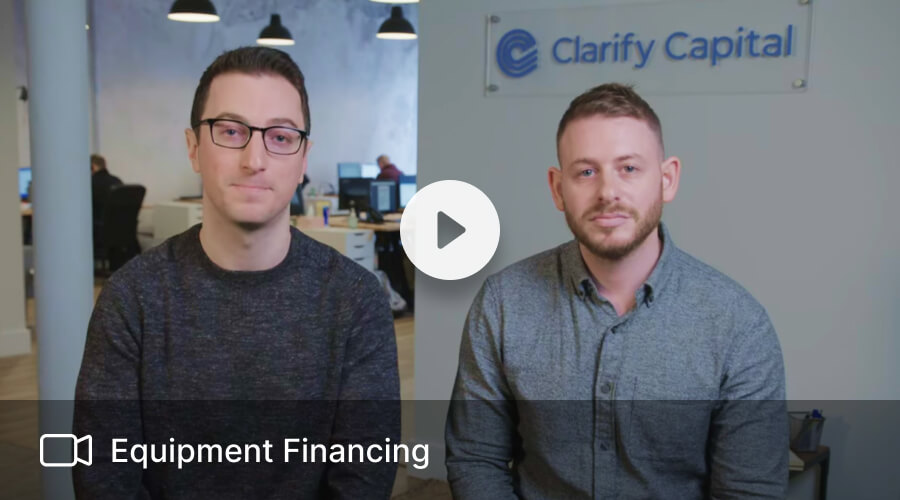Clarify vs. Typical Bank
Small businesses usually face a trade-off: Traditional banks offer competitive long-term rates but move slowly and have strict credit rules. Clarify Capital partners with a broad network of lenders to speed approval, accept lower credit profiles, and simplify paperwork, while still offering competitive loan sizes and rates.
| Bank Comparison |
|---|
| Feature | Clarify Capital | Typical bank |
|---|
| Approval time | Instant approval and get funds in your bank account within one to two days | Several weeks |
|---|
| Minimum credit score | 550, but credit is just one factor | 700+, must be good to excellent credit |
|---|
| Collateral | Equipment itself usually secures the loan | Requires additional collateral or guarantees |
|---|
| Rates | As low as 6% | Up to 45% |
|---|
| Best for | Fast funding, flexible underwriting, and those with less-than-stellar credit | Businesses with strong credit, time, and willingness to provide collateral |
|---|
Note: Interest rates for equipment financing have generally increased across the industry in 2025. Equipment financing APRs typically range from 4% to 45% based on 7% current prime rate. Rates may vary by lender, credit profile, and loan terms.
What Is Equipment Financing?
Equipment financing, also called an equipment loan, is a type of small business loan designed for the purpose of buying machinery or vehicles. It provides small business owners with capital to purchase new or used equipment needed to run their companies. You can take out equipment loans for a wide array of purchases, such as medical equipment, farm vehicles, or computer equipment.
The process to get an equipment loan is quick. Both traditional banks and online lenders offer this loan option. But although banks generally offer more favorable interest rates and terms, they also have strict credit requirements.
The amount you qualify for will depend on the purchase price of the machinery, but you might be able to finance up to 100% of the equipment's value. The length of the loan term will also depend on the equipment type, its condition, and how long it's expected to stay in service.
With equipment financing, the machinery you're purchasing serves as collateral for the loan. This means the lender can seize it if you fail to repay the loan. Some lenders may also require a personal guarantee, or they may use a blanket lien to lay claim on your assets in case you default.
This is why it's important to understand the rules of your contract, no matter what type of financing you're getting into. Different financing companies may also offer different terms, so it pays to compare options. Make sure you know the penalties in place in case you can't fulfill your obligations.
Tip: Businesses that finance qualifying equipment can often claim Section 179 deductions up to the current IRS limit, and may also be eligible for bonus depreciation, as long as the equipment is purchased and placed in service for business use.
What Can You Use Equipment Financing for?
You can use equipment financing to buy or lease any new or used equipment you need to operate your business. The lender will loan you a percentage of the equipment's full value. Once you've paid off your loan, you own the machinery free and clear.
Most small business owners take out equipment loans to purchase specialized machinery, like tractors, X-ray machines, and delivery trucks. Businesses may also use equipment financing to acquire intangible assets, like business-related software.
Types of Equipment Financed
From computers and office essentials to big-ticket items like heavy equipment and medical devices, equipment financing can help businesses in nearly any industry get the tools they need to operate and grow.
Common equipment types include:
Construction: Excavators, bulldozers, cranes, forklifts, and dump trucks.
Manufacturing and industrial: CNC machines, assembly‑line tools, presses, conveyors, and packaging machines.
Medical: Imaging machines, surgical tools, dental chairs, patient monitors, and lab gear.
Office and IT: Computers, servers, printers/copiers, networking gear, software licenses, and office furniture.
Vehicles and fleet: Delivery trucks, company vans, and other commercial vehicles.
Hospitality and retail: Commercial ovens, refrigeration, POS systems, display units, and cleaning equipment.
Agricultural: Tractors, harvesters, irrigation systems, and farm vehicles.
New vs. Used Equipment Financing
Deciding between new or pre‑owned equipment depends on your budget, how you plan to use the machinery, and how long you expect it to last. Understanding how each option stacks up can help you pick what fits your cash flow and growth plan.
| Equipment Financing Comparison |
|---|
| Feature | New equipment financing | Used equipment financing |
|---|
| Upfront cost | High | Low (lower purchase price means smaller loan amount) |
|---|
| Loan approval | Easier approval | Approval still possible, but lenders may limit age or type of equipment financed |
|---|
| Monthly payments | Higher (larger loan) | Lower (smaller loan) |
|---|
| Maintenance | Lower maintenance, and often with full warranty and support | Higher maintenance risk, and may lack warranty or have wear and tear |
|---|
| Resale value | Longer lifespan, with better resale potential | Shorter remaining lifespan, resulting in modest resale value |
|---|
Choose new equipment financing when you need long-term reliability with warranty coverage and plan to use the equipment for many years. Used equipment financing works well when you want to save on upfront costs and lower monthly payments and are comfortable with a shorter remaining lifespan in exchange for a lower price.
How Is Equipment Financing Different From Leasing?
The main difference between equipment financing and leasing is who owns it. When you lease, you pay the vendor for the privilege of using the equipment for the duration of the lease term. You don't own the asset, and you return it at the end of the term.
On the other hand, equipment loans allow you to purchase the piece of equipment outright with the machinery itself as collateral. Once you've paid off your loan, you own the equipment free and clear.
Leasing a piece of equipment is comparable to renting an apartment, while equipment financing can be compared to buying a house with a mortgage. Some reasons small business owners lease equipment include:
Easier approval. Leasing often has less strict requirements and a simpler application process than equipment financing.
No upfront cash. Leases typically require no money down or additional collateral, so you can acquire the asset without a large cash outlay or putting personal or business assets at risk.
Maintenance included. Because you are renting the equipment, the vendor or leasing company is usually responsible for repairs or replacements if it breaks down.
Flexible end-of-term options. At the end of the lease, you may be able to renew, return, or buy the equipment.
Easy upgrades. You can often lease a newer, updated version of the equipment at the end of the term, which is especially helpful for items like computers that quickly become outdated.
The biggest drawback of leasing is, of course, the cost. A business can reduce its business expenses during the initial term of the lease because it doesn't need a deposit or down payment. However, it may not be cost-effective for your business to pay monthly interest without the prospect of owning the equipment. This is especially true if the equipment is essential to the operations of your business.
For instance, if you own a bakery and need an industrial oven to make your products, renting the equipment long-term may cost you more money than buying it outright. This is why it's recommended that you consider leasing pieces of equipment if you'll only need them for 36 months or less. For machinery you'll use for as long as you're in business, it's a smarter move to buy it outright, and you can utilize equipment financing if you need it.
How Does Equipment Financing Work?
Equipment financing is a loan that a business owner takes out to purchase the equipment necessary to run their business. Commercial and industrial equipment is typically expensive, which means a huge expense for companies. However, most small businesses don't have the working capital to buy business-related equipment outright, so they use equipment financing.
If you've ever had a car loan before, you're already familiar with the overall structure of an equipment loan. The total amount you borrow depends on the type of equipment you need to purchase and whether it's new or pre-owned. Since the funding is secured with the equipment itself, there are no additional collateral requirements to get approved by a lender.
In this type of financing, you get approved for a loan amount depending on the equipment's value or purchase price. Then, you make loan payments that include interest and principal over a fixed term. Most equipment financing interest rates are fixed with monthly payment terms.
Many equipment financing companies also follow a straightforward process: application, underwriting, approval, and funding. As for the loan term, it varies depending on the life of the machinery.
It's recommended that you choose a repayment term that's close to how long you expect to use the equipment. For instance, if you're buying an oven for your bakery that you expect to use for seven years, you should get a seven-year term.
This is because if you agree to a shorter loan term, you might have to pay large monthly installments that cost more than you can afford. If you take out a long-term loan, however, you could be paying for the equipment even after you've stopped using it. A longer term than necessary also means more interest payments.
When Does It Make Sense To Use Equipment Financing?
For business owners in many industries, growth is a direct result of purchasing more equipment. The health care, transportation, and manufacturing industries are business models where growth is achieved through the number of vehicles or machines operating at any time.
What if your plans for growth are more extensive than what your current cash flow allows? How can you afford to buy the needed equipment to reach your goals? Fortunately, that's where equipment financing options come to the rescue. Equipment loans provide the working capital needed to take your business to the next level. For instance, if you're opening a bakery, you may need to rent a space for a storefront and a number of big-ticket items.
You'll need industrial convection ovens, heavy-duty mixers, refrigerators, and display cases, among other things. Let's say the total cost of the appliances you need is $60,000. You can apply for an equipment loan and get credit approval for as much as 100% of the total value of the kitchen appliances.
If you can get the full $60,000 as an equipment loan, it means you won't have to shell out any cash for your equipment needs, and you can use your available capital to pay for rent, wages, supplies, and other operating expenses.


